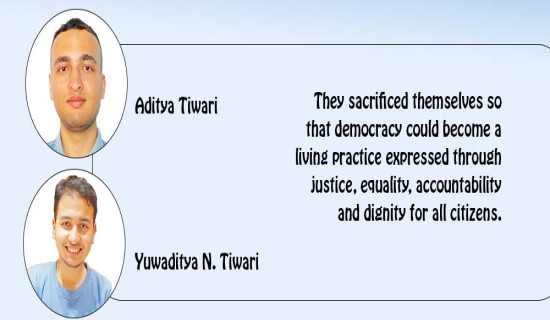- Friday, 30 January 2026
Let's Build A Resilient Health System
Nepal is bestowed with a rich cultural heritage and breathtaking landscapes. At the same time, it faces numerous challenges in building a robust healthcare system that can cater to the needs of its citizen. In order to transform Nepal into a healthy nation, it is imperative to conduct comprehensive health system research that addresses the country's unique healthcare needs and challenges. Therefore, building a resilient health system to transform the country as a healthy nation requires comprehensive research and data integration to identify the key challenges and develop effective strategies.
Assessment of the existing health system in the country, including infrastructure, human resources, service delivery, and financing is vital for formulating targeted interventions. This will help identify the strengths and weaknesses of the system. Therefore, health system research plays a vital role in shaping Nepal as a healthy nation and it has a potential impact on the healthcare landscape.
Inadequate funding
The healthcare system in Nepal is often portrayed as a country with a lack of infrastructure, inadequate funding, and a shortage of skilled healthcare professionals. Moreover, the country faces geographical limitations, with isolated areas having grossly inadequate access to healthcare facilities. In order to understand the current state of healthcare delivery, identify gaps, and formulate evidence-based strategies for improvement, health system research can help identify the key health priorities that need immediate attention. Relevant data from various sources, including health facilities, surveys, and medical records, is, therefore, crucial for prioritising the health needs of the population.
The data should cover a wide range of indicators, such as disease prevalence, health service utilisation, health workforce availability, and health financing system. The data is important to identify trends, gaps, and potential areas for improvement. Nepal's health landscape is also characterised by a combination of high incidences of communicable diseases, rapidly increasing non-communicable diseases burden, and poverty-related diseases mingled with inadequate healthcare infrastructure, limited access to quality healthcare services, and a lack of general health awareness among the general population. However, health system research can help identify the key health priorities that need immediate attention in Nepal.
By analysing demographic health data, conducting household and health facilities surveys, and engaging with local communities, researchers can gain insights into prevalent diseases, health disparities, and the social determinants of health. Thus, identifying health priorities through integrated system research is the key to delving into real scenarios, and developing interventions to address the specific health needs of the population.
The lack of adequate infrastructure is often cited as a major challenge to the healthcare system of the country. Health system research can provide valuable insights into the infrastructure gaps, such as the shortage of health service centers and medical equipment. By identifying these gaps, policymakers can prioritise infrastructure development, ensuring that healthcare services are accessible to all, particularly in remote areas. Therefore, strengthening the healthcare Infrastructure can only be optimum through health system research.
A well-trained and motivated healthcare workforce is crucial for delivering quality healthcare services. Health system research can help identify the gaps in healthcare workforce training, continuing educational needs, recruitment, and importantly retention. By understanding the challenges faced by healthcare professionals, policymakers can develop strategies to attract and retain skilled personnel, improve training programs, and address issues related to workload and burnout. However, a long-term substantial plan is needed for human resource development.
Another focus should be directed to promoting preventive healthcare. Preventive healthcare plays a critical role in reducing the burden of diseases and promoting the overall well-being of the population. Health system research can help identify the barriers to preventive healthcare practices in Nepal, such as lack of awareness, cultural beliefs, stigma and discrimination, and limited access to healthcare facilities. By understanding these barriers through health system research, policymakers can design targeted interventions to promote preventive healthcare, including health education campaigns, vaccination programs, and screening initiatives.
Adequate financing is indispensable for the sustainability and effectiveness of any healthcare system. Health system research can provide insights into the current health financing mechanisms in Nepal, including government funding, insurance schemes, and out-of-pocket expenditures. By analysing the existing financing models, appropriate policy can be formulated that identify gaps and develop strategies to ensure equitable access to healthcare services, reduce financial barriers, and explore innovative financing options, particularly for reducing out-of-pocket expenditures.
Approaches
Transforming Nepal into a healthy nation requires a comprehensive approach that addresses the unique healthcare challenges faced by the country. Health system research plays a pivotal role in understanding the current healthcare landscape, identifying health priorities, strengthening infrastructure, enhancing the healthcare workforce, promoting preventive healthcare, and strengthening health financing. It is essential to establish a robust monitoring and evaluation system to track the progress of the implemented strategies.
Regularly collecting and analysing data to assess the impact of the interventions is therefore to make necessary adjustments. This will help ensure that the health system remains resilient and responsive to the evolving needs of the population. By investing in research and evidence-based policymaking, Nepal can pave the way for a healthier future, ensuring that its citizens have access to quality healthcare services regardless of their geographical location or socioeconomic status.
(Dr. Lohani is the clinical director at the Nepal Drug and Poison Information Center. lohanis@gmail.com)

















